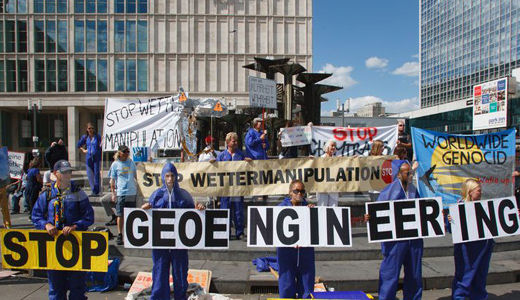
When a recent report suggested that injecting sulfur dioxide into the stratosphere as a means of artificially cooling the Earth, many environmentalists and scientists reacted strongly against the idea. The method, a form of geoengineering, is meant to combat the dilemma of climate change, but those who oppose the idea say it is not worth the risk.
The two-volume report, released Feb. 10 by the National Academy of Sciences, posed sulfuric injection as a way to potentially reflect the sun’s heat away from the planet, though they stopped short of citing it as an immediate solution. However, they did call for scientists to study and test the idea as soon as possible. It’s important to note that geoengineering, or altering the weather conditions of the world, was once considered a fringe idea, but in these climatically desperate times, portions of the scientific community seem to be arguing for desperate – though not necessarily beneficial – measures.
The suggested effort would mimic the effects of a volcanic eruption and have a cooling effect on the atmosphere, supporters argue, yet experts worry about the unknown, potentially dangerous side effects that could emerge from such an undertaking. In a way, many scientists recognize it as playing with fire, or at the very least, regard it as a last resort.
“Carrying out a geoengineering effort to modify the life support system all life on Earth depends upon – the climate – is an extremely risky undertaking that is more likely to do harm than good,” said Jeff Masters, director of meteorology at Weather Underground. “Still, at the rate we’re going, Team Earth may be down multiple touchdowns late in the game later this century, leading us to try this desperate ‘Hail Mary’ pass.”
Marcia McNutt, committee chair and former director of the U.S. Geological Survey, remarked, “That scientists are even considering technological interventions should be a wake-up call that we need to do more now to reduce [greenhouse gas] emissions, which is the most effective, least risky way to combat climate change.”
Ben Schreiber, climate and energy program director of Friends of the Earth, added, “While we agree that the current level of greenhouse gas emissions leaves us vulnerable to climate chaos, geoengineering will take us in the wrong direction. It serves as a dangerous distraction from the crucial discussions and actions that need to take place to mitigate and adapt to climate disruption.
“Geoengineering presumes that we can apply a dramatic technological fix, instead of facing the reality that we need to reduce our emissions, lower our consumption levels, and rapidly transition to renewable energy. Some hope to simply reengineer the climate, the land, and the oceans to theoretically slow down and reverse climate [change].
“The side effects of geoengineering interventions are unknown and untested. In order to have any noticeable impact on global temperatures, [such] projects would have to be deployed on a massive scale. These ‘experiments’ would not only take action in the absence of scientific consensus, hence violating the precautionary principle, but could also easily have unintended consequences due to mechanical failure, human error, inadequate understanding of ecosystems, unforeseen natural phenomena, irreversibility, or funding interruptions.”
Social activist Naomi Klein, author of This Changes Everything: Capitalism vs. the Climate, said that the authors of the geoengineering report “boldly call for these tests to go ahead even in the absence of any regulatory system governing them. They explicitly state that ‘governance and experimentation must co-evolve,’ which is a high-minded way of saying, ‘let’s roll the dice and see what happens.’ “
Photo: Geoengineering Watch











Comments